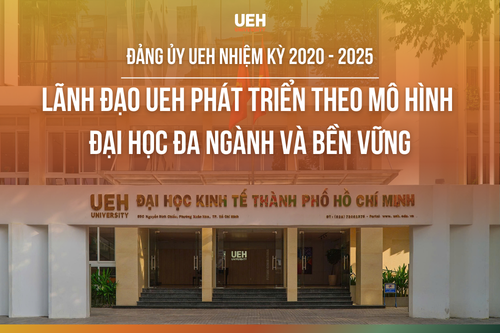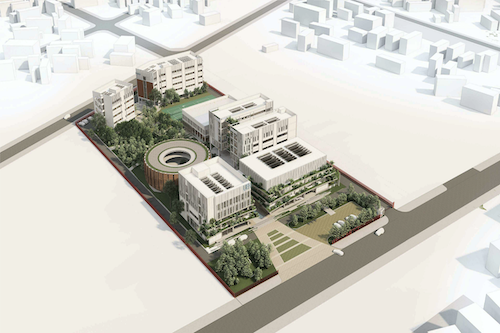
UEH Participated in 2025 Southeast Asia and Taiwan University Presidents' Forum (SATU), Discussing Innovation, Entrepreneurship, and Translational Research
21 Nov, 2025
From November 9-14, 2025, a delegation from the University of Economics Ho Chi Minh City (UEH) attended the 2025 Southeast and South Asia and Taiwan University Presidents' Forum (SATU), hosted by the Indian Institute of Technology Bombay (IIT Bombay) in India. The forum's theme was "Translational Research & Innovation Ecosystem for Universities in Asia."
The UEH delegation was led by Prof. Dr. Nguyen Khac Quoc Bao – Chairman of the UEH Council, and included Mr. Tran Hoang Tam, M.A. – Deputy Head of the Department of Finance and Investment Planning, and Mr. Vo Duc Hoang Vu, M.A. – Deputy Head of the Department of Research - Development and Global Engagement.
SATU 2025: A Multidimensional Platform for Translational Research
The Southeast Asia and Taiwan University Presidents' Forum (SATU) is a prestigious network that brings together leading higher education institutions in the region to foster research collaboration and academic exchange. This year's theme, "Translational Research," focused on bridging the gap between academic research and practical application, building and strengthening university-based entrepreneurship and innovation ecosystems, and connecting research, startups, and the market to solve societal and business challenges.
The 2025 forum, hosted by IIT Bombay, gathered over 22 universities and 41 international delegates from 9 countries in the region, creating a deep and multidimensional networking space for researchers, administrators, and innovation experts.
The UEH delegation at the forum
Delegates from Southeast and South Asian and Taiwanese universities at the event
During the main working days, the UEH delegation participated in numerous report sessions and discussions with IIT Bombay and other regional universities. The core topics revolved around developing innovation ecosystems, entrepreneurship, and translational research, with key highlights including:
- IIT Bombay's innovation ecosystem, featuring the Desai Sethi School of Entrepreneurship (DSSE), the Technology Innovation Hub (TIH), and the ASPIRE research campus, demonstrating the university's tight integration of research, training, and commercialization.
- The IDEAS Program and practical experiences from young startups like JalViks and Neroex, which provided a vivid look at the entrepreneurial journey from the lab to the market.
- A panel discussion on "Translational Research in India," featuring representatives from ImmunoACT, Atomberg, and Babblebots.AI—exemplary companies in translating research into real-world applications.
- An exchange on the role of universities in innovation and cooperation opportunities between South Asia, Southeast Asia, and Taiwan, emphasizing the importance of regional academic connectivity in the era of open innovation.
An overview of the working session
Speaking about the event, Prof. Sudarshan Kumar, Head of International Relations at IIT Bombay, emphasized that the forum is a testament to the immense potential that arises when leading regional universities share a common vision for development, helping to transform knowledge into tangible benefits for the community and society.
At the forum, Prof. Dr. Nguyen Khac Quoc Bao noted that many of IIT Bombay's activities, from innovation and entrepreneurship to translational research, shared strong similarities with UEH's development orientation. Both institutions, he stated, were committed to applying academic knowledge for socio-economic development, forging close ties between research and business, thereby building a sustainable university innovation ecosystem.
Prof. Dr. Nguyen Khac Quoc Bao also expressed his hope for future bilateral cooperation between UEH and IIT Bombay, including academic exchanges, sharing university governance experiences, and developing joint initiatives in translational research and innovative entrepreneurship.
Prof. Dr. Nguyen Khac Quoc Bao spoke at the forum
IIT Bombay's Innovation Ecosystem: From Laboratory to Market
IIT Bombay is considered a model for a leading research and innovation institute in Asia, with a closed-loop ecosystem connecting research, entrepreneurship, and commercialization. At its core is the Industrial Research and Consultancy Centre (IRCC), along with infrastructure like TRC, ASPIRE, and CSIF, where over 950 patents are filed annually and hundreds of corporate partnership projects are implemented.
The Desai Sethi School of Entrepreneurship (DSSE) handles training and early-stage incubation through its IDEAS program, while the Society for Innovation and Entrepreneurship (SINE) supports startups in accelerating from idea to market. Additionally, the Technology Innovation Hub (TIH) connects academia with industry in fields such as AI, biomedicine, energy, and smart manufacturing, creating a dynamic ecosystem that drives knowledge transfer and sustainable societal value.
The IDEAS Program & Startup stories: JalViks and other exemplary models
The IDEAS Program at DSSE is a pre-incubation program that helps startup teams develop from idea to product through mentorship, training, and financial support. JalViks Climate Service, a climate and agri-tech startup, emerged from this program, providing a solution for predictive and efficient irrigation management that helps farmers reduce water consumption by 10-30%. JalViks received comprehensive support from IDEAS and SINE, from research to commercialization, exemplifying the "Translational Research to Startup" model that IIT Bombay is pioneering in the region.
Prof. Milind Atrey, Deputy Directorr- ART(Academics, Research and Translation) of IIT Bombay, spoke about SINE
Panel discussion on "Translational Research in India" – Where research meets practice
The panel discussion on "Translational Research in India" featured representatives from startups originating from IIT Bombay, showcasing their success in transforming research into socially impactful products.
Speakers from ImmunoACT, Atomberg, and Babblebots.AI shared their development journeys within IIT Bombay's innovation ecosystem. ImmunoACT introduced India's first indigenously developed CAR-T cell therapy, a major breakthrough in cancer treatment. Atomberg presented its energy-efficient BLDC fan solution, now widely commercialized and a symbol of "Make in India" innovation. Meanwhile, Babblebots.AI, a voice AI startup, showcased an automated AI-powered interview model that reduces recruitment process time by up to 90%.
The discussion highlighted the role of centers like SINE, TIH, and TRC in accompanying research teams from the idea and experimentation stages to commercialization. Thereby, IIT Bombay affirms that the "translational research" model does not stop at scientific publication but is also a crucial bridge between academic knowledge and applied value in life.
Field visits and bilateral meetings
In addition to the main sessions, the UEH delegation visited key units within IIT Bombay's innovation ecosystem, particularly the Society for Innovation and Entrepreneurship (SINE). There, the delegation presented UEH's ongoing activities and learned about the operational model of India's leading technology incubator, which served as a bridge between the university, researchers, and enterprises in developing and commercializing technology products.
The delegation visited the SINE complex at IIT Bombay
SINE provides comprehensive support for startups, including co-working spaces, labs, legal and financial consulting, investor networking, and training activities like workshops and Demo Days. The center has supported over 500 university- and institute-born enterprises, contributing to a vast innovation network across India.
Furthermore, the UEH delegation actively met with several other member universities of the SATU network to discuss cooperation in joint research, co-hosting international conferences, faculty and student exchanges, and developing joint incubation and startup programs. These discussions opened up numerous opportunities for substantive collaboration, aligning with UEH's internationalization and sustainable development goals for the 2025-2030 period
Other images from the Forum:
Pillars: Training, Research, Community Connection
Project: UEH Connecting
News, photos: Department of Research - Development & Global Engagement



.JPG)
.JPG)
.JPG)
.JPG)
.JPG)
.JPG)
.JPG)
.JPG)
.JPG)
.JPG)
.JPG)
.JPG)
.JPG)
.JPG)






